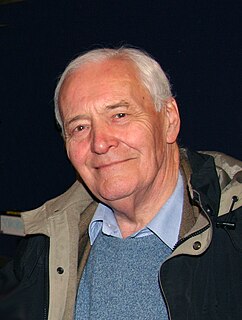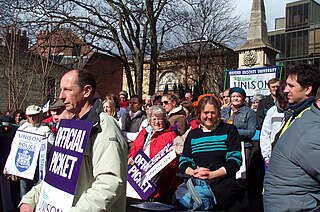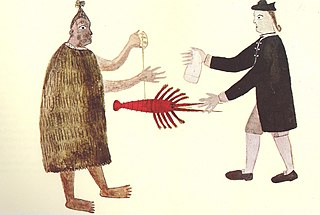Related Research Articles
A commonwealth is a traditional English term for a political community founded for the common good. Historically, it has been synonymous with "republic". The noun "commonwealth", meaning "public welfare, general good or advantage", dates from the 15th century. Originally a phrase, it comes from the old meaning of "wealth", which is "well-being", and is itself a loose translation of the Latin res publica (republic). The term literally meant "common well-being". In the 17th century, the definition of "commonwealth" expanded from its original sense of "public welfare" or "commonweal" to mean "a state in which the supreme power is vested in the people; a republic or democratic state".

Anthony Neil Wedgwood Benn was a British politician, writer and diarist who served as a Cabinet minister in the 1960s and 1970s. A member of the Labour Party, he was Member of Parliament for Bristol South East and Chesterfield for 47 of the 51 years between 1950 and 2001. He later served as President of the Stop the War Coalition from 2001 to 2014.

A Commonwealth realm is a sovereign state in the Commonwealth of Nations whose monarch and head of state is shared among the other realms. Each realm functions as an independent state, equal with the other realms and nations of the Commonwealth. The current monarch of each Commonwealth realm is King Charles III, who succeeded his mother, Elizabeth II, on 8 September 2022.

Republicanism in the United Kingdom is the political movement that seeks to replace the United Kingdom's monarchy with a republic. Supporters of the movement, called republicans, support alternative forms of governance to a monarchy, such as an elected head of state.
The Commonwealth of Britain Bill was a bill first introduced in the House of Commons in 1991 by Tony Benn, then a Labour Member of Parliament (MP). It was seconded by the future Leader of the Labour Party, Jeremy Corbyn.
The Socialist Campaign Group, officially the Socialist Campaign Group of Labour MPs and also known as the Campaign Group, is a left-wing, democratic socialist grouping of the Labour Party's Members of Parliament in the House of Commons of the United Kingdom. It was formed in December 1982 following the 1981 Labour Party deputy leadership election when a number of soft left MPs, led by Neil Kinnock, refused to back Tony Benn's campaign, leading a number of left-wing Benn-supporting MPs to split from the Tribune Group to form the Socialist Campaign Group.
Charter 88 was a British pressure group that advocated constitutional and electoral reform and owes its origins to the lack of a written constitution. It began as a special edition of the New Statesman magazine in 1988 and it took its name from Charter 77 – the Czechoslovak dissident movement co-founded by Václav Havel. It also has a faint echo of the far more popular mid-19th century Chartist Movement of England that resulted in an unsuccessful campaign for a People's Charter and also Magna Carta or 'Great Charter' of 1215. In November 2007 Charter 88 merged with the New Politics Network to form Unlock Democracy.

The United Kingdom European Communities membership referendum, also known variously as the Referendum on the European Community , the Common Market referendum and EEC membership referendum, took place under the provisions of the Referendum Act 1975 on 5 June 1975 in the United Kingdom to gauge support for the country's continued membership of the European Communities (EC) — often known at the time as the European Community and the Common Market — which it had entered two-and-a-half years earlier on 1 January 1973 under the Conservative government of Edward Heath. The Labour Party's manifesto for the October 1974 general election had promised that the people would decide through the ballot box whether to remain in the EC.

The Federation of Australia was the process by which the six separate British self-governing colonies of Queensland, New South Wales, Victoria, Tasmania, South Australia, and Western Australia agreed to unite and form the Commonwealth of Australia, establishing a system of federalism in Australia. The colonies of Fiji and New Zealand were originally part of this process, but they decided not to join the federation. Following federation, the six colonies that united to form the Commonwealth of Australia as states kept the systems of government that they had developed as separate colonies, but they also agreed to have a federal government that was responsible for matters concerning the whole nation. When the Constitution of Australia came into force, on 1 January 1901, the colonies collectively became states of the Commonwealth of Australia.

The Australian republic referendum held on 6 November 1999 was a two-question referendum to amend the Constitution of Australia. The first question asked whether Australia should become a republic with a President appointed by Parliament following a bi-partisan appointment model which had been approved by a half-elected, half-appointed Constitutional Convention held in Canberra in February 1998. The second question, generally deemed to be far less important politically, asked whether Australia should alter the Constitution to insert a preamble. For some years opinion polls had suggested that a majority of the electorate favoured a republic. Nonetheless, the republic referendum was defeated, partly due to division among republicans on the method proposed for selection of the president and dissident republicans opposed the president to have strong executive power.
The state known today as Ireland is the successor state to the Irish Free State, which existed from December 1922 to December 1937. At its foundation, the Irish Free State was, in accordance with its constitution and the terms of the Anglo-Irish Treaty, governed as a constitutional monarchy, in personal union with the monarchy of the United Kingdom and other members of what was then called the British Commonwealth. The monarch as head of state was represented in the Irish Free State by his Governor-General, who performed most of the monarch's duties based on the advice of elected Irish officials.

Eric Samuel Heffer was a British socialist politician. He was Labour Member of Parliament for Liverpool Walton from 1964 until his death. Due to his experience as a professional joiner, he made a speciality of the construction industry and its employment practices, but was also concerned with trade union issues in general. He changed his view on the European Common Market from being an outspoken supporter to an outspoken opponent, and served a brief period in government in the mid-1970s. His later career was dominated by his contribution to debates within the Labour Party and he defended the Liverpool City Council.

Trade unions in the United Kingdom were first decriminalised under the recommendation of a Royal commission in 1867, which agreed that the establishment of the organisations was to the advantage of both employers and employees. Legalised in 1871, the Trade Union Movement sought to reform socio-economic conditions for working men in British industries, and the trade unions' search for this led to the creation of a Labour Representation Committee which effectively formed the basis for today's Labour Party, which still has extensive links with the Trade Union Movement in Britain. Margaret Thatcher's governments weakened the powers of the unions in the 1980s, in particular by making it more difficult to strike legally, and some within the British trades union movement criticised Tony Blair's Labour government for not reversing some of Thatcher's changes. Most British unions are members of the TUC, the Trades Union Congress, or where appropriate, the Scottish Trades Union Congress or the Irish Congress of Trade Unions, which are the country's principal national trade union centres.

The monarchy of Australia is Australia's form of government embodied by the Australian sovereign and head of state. The Australian monarchy is a constitutional monarchy, modelled on the Westminster system of parliamentary government, while incorporating features unique to the Constitution of Australia.

The independence of New Zealand is a matter of continued academic and social debate. New Zealand has no fixed date of independence from the United Kingdom; instead, political independence came about as a result of New Zealand's evolving constitutional status. The concept of a national "Independence Day" does not exist in New Zealand.

The Roman Constitution was an uncodified set of guidelines and principles passed down mainly through precedent. The Roman constitution was not formal or even official, largely unwritten and constantly evolving. Having those characteristics, it was therefore more like the British and United States common law system than a sovereign law system like the English Constitutions of Clarendon and Great Charter or the United States Constitution, even though the constitution's evolution through the years was often directed by passage of new laws and repeal of older ones.
On 30 November 2021, Barbados transitioned from a parliamentary constitutional monarchy under the hereditary monarch of Barbados to a parliamentary republic with a ceremonial indirectly elected president as head of state. The prime minister remained head of government while the last Governor-General, Dame Sandra Mason, was elected as the country's first President on 20 October 2021, and took office on 30 November 2021.

The Constitution of the United Kingdom or British constitution comprises the written and unwritten arrangements that establish the United Kingdom of Great Britain and Northern Ireland as a political body. Unlike in most countries, no attempt has been made to codify such arrangements into a single document, thus it is known as an uncodified constitution. This enables the constitution to be easily changed as no provisions are formally entrenched; the Supreme Court of the United Kingdom recognises that there are constitutional principles, including parliamentary sovereignty, the rule of law, democracy, and upholding international law.
The term Dominion was used to refer to one of several self-governing nations of the British Empire.
The Perth Agreement was made in Australia in 2011 by the prime ministers of the sixteen states known as Commonwealth realms, which at the time all recognised Elizabeth II as their head of state. The document agreed that the governments of the realms would amend their laws concerning the succession to their shared throne and related matters. The changes, in summary, comprised:
References
- ↑ "103", Commonwealth of Britain Bill, vol. 310336, HMSO, 1991
- ↑ Sutherland, Keith (2000). The Rape of the Constitution?. Imprint Academic. pp. 33–60. ISBN 978-0-907845-70-6.